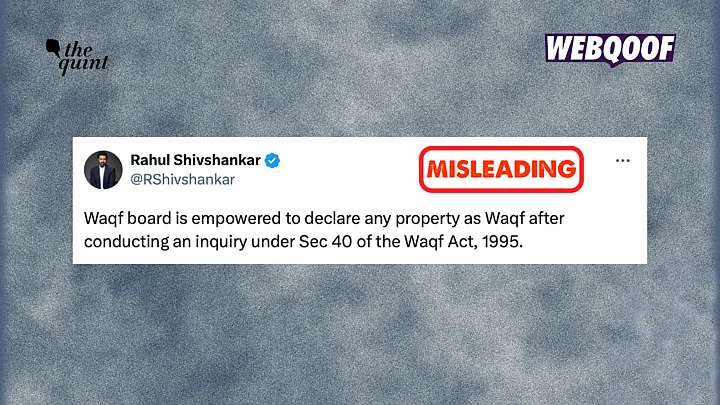Sharing news about a village in Maharashtra, CNN-News18 Consulting Editor Rahul Shivshankar claimed that the Waqf Board is "empowered to declare any property as Waqf after conducting an inquiry under Sec 40 of the Waqf Act, 1995 (sic)."
In his post, the journalist claimed that the Waqf board was free to declare "any property as Waqf" after an enquiry, and any dispute regarding the inquiry report would be determined by the Waqf Tribunal, and that civil courts do not have jurisdiction in this matter.
This claim surfaces regularly on social media platforms. We found similar claims from 2021, 2022, and 2023, among many more posts.
However, this claim is misleading.
In this report, we explore the Waqf Act and what it means.
Does Section 40 of the Waqf Act Give the Board the Right To Take Possession of Any Property?
We went through Section 40 of the Waqf Act 1995, as available on the website of the Ministry of Minority Affairs. Section 40 pertains to which properties the Waqf board can claim.
According to this section, if the Waqf has any reason to believe that the property of any registered trust or registered society belongs to the Waqf, they can send a notice to them.
There is no mention of directly claiming any properties, nor does it say anything about private properties.
The question arises – can the Board declare any property as Waqf property?
The Act answers this question, too. In the same section, the Act says that if the Board feels that there is a reason for the property to be Waqf, only then can it make its claim.
Section 3 of the Waqf Act defines what a Waqf property is. It says –
"Waqf means the permanent dedication by any person, of any movable or immovable property for any purpose recognised by the Muslim law as pious, religious or charitable..."
Further points also mention that a property can only be Waqf "when the line of succession fails," which means that the property will not be inherited by future generations.
We found the same definition in Justice SL Jafri's book, 'Wakf Laws in India'.
In 2013, the Central Government had issued a gazette regarding some amendments in the Waqf Act, but no changes have been made in this gazette regarding Section 40.
SMH Zaidi, an expert on Waqf rules, also confirmed to The Quint that the Waqf Board can claim only those properties which:
Have been donated by a person following Islam.
Have been donated for religious or social work, but are not being used for the same.
This claim that Waqf has the right to claim any property of the country is not true.
"According to the Waqf Act, the Waqf Board can claim only those properties which have been donated by a person following Islam for religious/social work, that too when the property is registered in the name of a trust or institution. Waqf cannot claim private property. Waqf can neither claim nor send notice on the property of a non-Muslim person. The first condition is that the person is a follower of Islam and has donated the property for religious purposes."SMH Zaidi, Waqf Act expert
Conclusion: It is evident that the Waqf board cannot lay claim on any given property in India.
(Not convinced of a post or information you came across online and want it verified? Send us the details on WhatsApp at 9540511818 , or e-mail it to us at webqoof@thequint.com and we'll fact-check it for you. You can also read all our fact-checked stories here.)
(At The Quint, we question everything. Play an active role in shaping our journalism by becoming a member today.)
